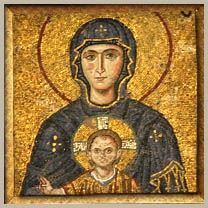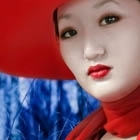These amazing drawings prove that the mosaics of Hagia Sophia were uncovered for almost 300 years after the conquest. Millions of Muslim worshippers prayed under Christ, the Virgin and the Seraphim.

Chapter XXVIII
My Husband Arrested
More and more feverishly we continued to look out for news from the north of Russia. We knew that the eleven Embassies and Legations of the Allies, which had been at Vologda since April 3rd, had left that town on July 11th/24th for. Archangel, despite the opposition of the Commissaries of the People, who wished to attract the Entente representatives to Moscow in order to keep them as hostages. They arrived at Archangel on July 15th/28th and embarked, not without difficulty, for Kaudalatchko at the farther end of the White Sea, on the line from Murmansk to Petrozavodsk.
Some days later, a French battalion, supported by some French and English ships, occupied Archangel, in order to make it the base of a movement aimed at reconstituting the East front against the Germans with the help of the remnants of the old Russian army. The Allied Diplomatic Missions returned to Archangel on August 7th. A Russian Ministry, at the head of which there was a Socialist of the Right, Tchaikovsky, had assumed power under the title of the Government of the North, and was adoptiug the attitude of enemy to the Bolshevists, the latter having become the allies of Germany.
The French, Russian, Italian, English and American contingents which had been sent to Archangel were dispatched by the British Commander-in-Chief. They were announced for the month of August, but most of them arrived only at the time of the rains which transform the north of Russia into an immense marsh. These delays, and the weakness with which the military operations were conducted, gave the impression that the English did uot really want to engage in a serious action against the Bolshevists. From this time onwards many Russians came to believe that the British Government, far from wishing to put an end to the Communist anarchy, contemplated, on the contrary, prolonging it. It is true that, after some show of military activity from the side of the extreme East and Siberia, the American and Japanese troops had pulled up at Karbin instead of going on to the support of the Czechs, who were resisting the Bolshevists at Omsk and to the east of the Urals. The responsibility of the English in the matter of the inaction of the Allied troops was therefore shared with the other Governments.
In any case, the signing of the Armistice between the Entente and Germany in November, 1918, and the general feeling of lassitude in regard to the war, were bound to stop the execution of the programme of military intervention which had been planned against Soviet Russia and Germany. The Bolshevists were pleased to rouse shouts of victory. In reality it was the Allies who abandoned the carrying out of their projects and who recalled their troops. It was this decision which completed poor Russia's misfortunes and our own.
In the course of the day of July 30th/ August 12th the Grand Duke's faithful valet told us that the miraculous ikon of St. Nicholas had been brought from Kolpino to Tsarskoe and that the priests offered to bring it round to us and to celebrate a Te Deum. It is the custom in Russia to take miraculous ikons to people who are ill or very unhappy. We were extremely glad to accept. Towards four o'clock a Te Deum took place in the Grand Duke Boris's dining~room. God permitted that on this last day of his freedom on the earth the Grand Duke was able to pray to St. Nicholas, the object of peculiar veneration in Russia, and to beseech his support in the terrible Calvary which was to begin during the night.
M. de Scavenius was right. The Bolshevists had selected their new victims - the few Grand Dukes who still remained in Russia. The Grand Duke Nicholas Michailovitch was brought back from Vologda with his faithful aide-de-camp, General de Brummer. His brother, the Grand Duke George Michailovitch, who was awaiting in Finland, at Helsingfors, the moment when. he should embark for England, where his wife and two daughters were already, was handed over by the Red Finns and taken back to Petrograd. The Grand Duke Dimitri Constantinovitch, who had been allowed to remain in the capital on grounds of health, like my husband, was placed in company with his cousins, and all three were taken to the prison in Schpa1ernala, in the town. Only the Grand Duke Paul and Prince Gabriel were still free.
The Te Deum over, the Grand Duke felt comforted. He knew that his three cousins had been arrested the day before, and I read in his dear eyes a look of firm and calm resolution. That evening we received a visit from Ivanoff, who often came to see us. He had tried to raise an anti-Bolshevist army, but his means were reduced and he had nothing left but his courage. Nevertheless, he came to ofter to carry off the Grand Duke at once in an automobile which had been lent to him for this purpose, and to hide him away in a safe place. Once more the Grand Duke refused. Then came M. Roumanoff, my son's publisher, and two or three other persons. The evening was spent in tranquillity. The Grand Duke, as was his custom, said his night prayers with his two daughters. At miduight the house was plunged in sleep and silence.
At three in the morning there was a knock, and we heard the low voice of Colonel Petrokow:
"Monseigneur, Madame, get up! They are going to make a perquisition."
Our hearts beating, we got up hurriedly. Before opening the door, I concealed in my bodice a letter-case containing 15,000 roubles which I had just received from a Jewess for a fur coat which I had sold to her. My hands trembling, I opened the door. I saw Colonel Petrokow, as white as a sheet, and ten soldiers armed with guns and revolvers-they were making a tremendous clatter with their guns and their boots. The electric light was full on. Doors were open in all the rooms which gave on the first floor gallery. I saw Miss White and Jacqueline, my maid; then my two little daughters appeared on the scene in their long night~dresses, their feet bare, their arms round each other and looking towards us with their large, troubled eyes.
The chief of the band, a horrible-looking brigand, clean-shaven in American style, began the perquisition. He sent a soldier to make a search in the cabinets on the first floor for any description of food-flour, sugar, tea, coffee, etc. I had hidden in my clothes~cabinet a big sack of flour which I kept exclusively for the Grand Duke's bread. This soldier, finding himself alone with me, murmured:
"Where is the flour? Tell me, so that I mayn't go near it."
motioned towards the cabinet; he left it alone and returned, saying that there was nothing. The others in the meantime were ransacking everywhere. They took possession of the entire correspondence of the Grand Duke Boris, of a diary which my husband was keeping (in a very discreet fashion), and some letters which were in his writing-table and in mine. The letters from my son Alexander, who had been for seven months at Stockholm, interested them much. They did not touch those from Vladimir. Coming upon a piece of furniture in which I had placed three pounds of tea and two kilos of sugar, they at once took the whole. Finally, unearthing about ten bottles of Madeira and vodka in a sideboard, they were particularly gleeful. They carried out their search to an accompaniment of infamous jests aud ribaldry.
At last the chief of the band ordered the man who had spared my flour to take the Grand Duke to the Tsarskoe Soviet, which was located now in the palace of the Grand Duchess Vladimir. I asked whether there was a written order for that. He showed a document signed Ouritzky. The Grand Duke \vent off to dress and to pack his suit-case. In a moment I was ready, with my hat and cloak on and a bag in my hand. The chief of the band looked at me.
"The possibility of your wishing to accompany your husband has been considered. Although you are free, you can come with him."
I did not condescend to reply. The little daughters had their arms round their father's neck, and their frail bodies were shaken with sobs. My husband was caressing their curly heads and was a prey to emotions which he found it hard to master. At last we got into the automobile in which the chief of the bandits had come. The night was warm and black. The soldier got in with us. The others took up their position on the steps leading up to the hall door of the house, and we heard the noise of corks being extracted.
Inside the car the usual scene took place. The soldier, P by name, swore his fidelity and said he had been enrolled by force. I have since learnt that, overcome by remorse, he inflicted punishment on himself by blowing out his brains. It was half-past four when we arrived at the Grand Duchess Vladimir's palace. Day was dawning; we got out of the carriage and we were taken into what used to be the concierge's lodge, where we were left by ourselves. The Grand Duke was resigned.
"Our happiness is at an end," he said. "I don't know how much longer I have to live, but I thank you with all my whole soul, with all the strength of my heart which loves you, which has never loved anyone save you, for these twenty-five years of happiness. Take good care of the little daughters-that is your duty and my wish. . . ."
His voice was trembling with emotion. I could not utter a word. I took his dear hand in both of mine and kissed it devotedly, weeping. . . .





